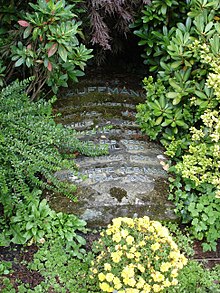Fritz Alexander Kauffmann
Fritz Alexander Kauffmann (born June 26, 1891 in Denkendorf ; † May 19, 1945 in Ebersbach an der Fils ) was a German educator and writer .
Life
Fritz Alexander Kauffmann was born on June 26, 1891 as the son of mustard manufacturer Carl Kauffmann, grandson of Friedrich Kauffmann , in the former monastery of Denkendorf near Esslingen in Württemberg. The monastery grounds were privately owned by the family from 1830 to 1907. Kauffmann studied Romance languages, English and art history at the University of Tübingen , in Paris and London . After participating in the First World War , he entered the higher education service. In 1919 he was first a student assistant in Stuttgart and then in 1922 a teacher at the secondary school in Pfullingenwhich he directed from 1928. and was also the editor of a schoolbook that was used for a long time. In 1931 he became professor for art and drawing lessons at the Pedagogical Academy in Halle . Kauffmann was a member of the German Democratic Party (1920 to 1931/32) and the German League for Human Rights (August 1924 to August 1932). After the Nazis seized power in 1933, Kauffmann ran into difficulties, and joining the NSDAP on May 1, 1933 could no longer help him. At the age of 42, Kauffmann was retired by the Prussian Ministry of the Interior in autumn 1933 . Kauffmann and his family retired to their parents' villa on the company premises in Ebersbach, where he lived as a private scholar. Although he was now able to devote himself to “free writing” until the end of the war, with full pension payments, Kauffmann found the forced separation from teaching as a humiliation. All requests for reuse were rejected by the National Socialist government.
Just as Theodor Fontane wrote down his childhood during a serious illness, following the advice of doctors, Kauffmann also processed this difficult conflict into a work that was only published posthumously in 1956, which is both in the tradition of childhood books and based on the classic Bildungsroman remind. In epic breadth he describes his boyhood, the security at home in the Swabian provinces: nature, people, conflicts - "heaven and hell" from the age of two to twelve; personal, but always in a distant "he" form.
The work remained incomplete; In 1945 Kauffmann died in a traffic accident. A memorial in the “Alte Post” city museum in Ebersbach an der Fils recalls his life and work.
His wife Gertrud (1890–1965), daughter of the art historian Eugen Gradmann , had a doctorate in art history and in 1937 published the development novel Verena under the pseudonym "Gertrud Hörlin" . They had three children (Agathe, Thomas (1924–2012) and Andreas).
Publications
- The wave of Hokusai. A picture viewing . Herbig, Berlin 1938 (again Klett, Stuttgart 1966).
- German living . German publisher, Berlin 1940.
- Rome's eternal face, the fate of shape of a city . Riemerschmidt, Murnau 1940.
- The new German painting . German publisher, Berlin 1941.
- Churches and monasteries of the Upper Swabian Baroque. The attempt at a design . Badischer Verlag, Freiburg 1949.
- Leonhard - Chronicle of a Childhood . Deutsche Verlags-Anstalt, Stuttgart 1956 (again Manesse-Verlag, Zurich 1985).
literature
- Gertrud Kauffmann, Kai Kauffmann: Fritz Alexander Kauffmann's "Gemach" in Ebersbach . In: Ute Harbusch, Gregor Wittkop (Ed.): Short stay. Forays through literary places . Göttingen 2007, pp. 117-120
- Kai Kauffmann : Fritz Alexander Kauffmann in Ebersbach / Fils: "Aesthetic Gegewelten" (= tracks 65). German Schiller Society, Marbach am Neckar 2004, ISBN 3-933679-97-4 .
- Hermann Taigel: Fritz Alexander Kauffmann - a people and art teacher in Pfullingen . In: Schwäbische Heimat 5, 2008, pp. 197–201.
Individual evidence
- ^ Kai Kauffmann: Fritz Alexander Kauffmann in Ebersbach / Fils: “Aesthetic Counterworlds” . (= Lanes 65). Deutsche Schillergesellschaft, Marbach am Neckar 2004, ISBN 3-933679-97-4 , p. 1; 15: Membership number 2,761,658.
- ↑ Cf. Gertrud Kauffmann and Kai Kauffmann: Fritz Alexander Kauffmann's "Gemach" in Ebersbach , in: Ute Harbusch, Gregor Wittkop (ed.): Short stay. Forays through literary places . 2007, pp. 117-120.
Web links
- Literature by and about Fritz Alexander Kauffmann in the catalog of the German National Library
- Estate in the German Literature Archive in Marburg
| personal data | |
|---|---|
| SURNAME | Kauffmann, Fritz Alexander |
| BRIEF DESCRIPTION | German teacher and writer |
| DATE OF BIRTH | June 26, 1891 |
| PLACE OF BIRTH | Denkendorf |
| DATE OF DEATH | May 19, 1945 |
| Place of death | Ebersbach an der Fils |


